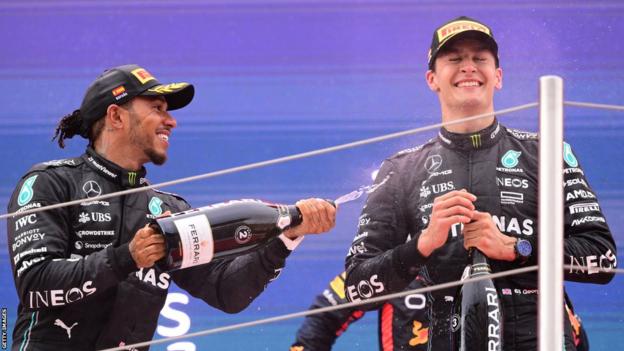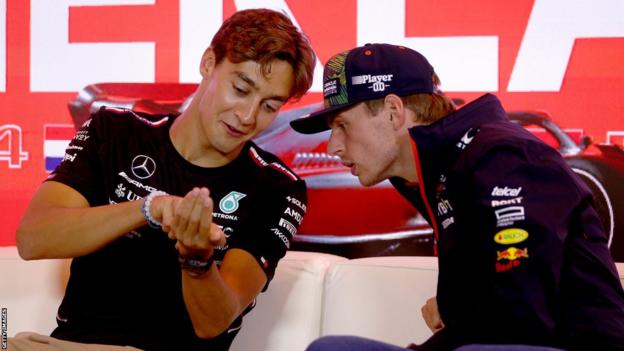
For someone who straps himself into a car and hurtles around a track for a living, you’d imagine George Russell is pretty much fearless when it comes to physical pursuits.
But when faced with open water, Russell has had to deal with his own anxieties.
“I was scared of the water as little as two years ago – being a kid from the countryside in the UK, and never being exposed to clear blue water like you see in the Mediterranean,” he says.
Yet one glance at his recent social media posts alleviates any doubts Russell couldn’t overcome this fear, with the 25-year-old now very much a water baby.
“I’m getting a new fun love for the sea and doing water sports, learning to surf, learning to freedive,” he says.
Time spent in the waves is also giving Russell an escape from the intensity of life as an F1 driver.
“It’s a way that I find peace,” he says. “It’s a way I disconnect from my sport and mentally recharge.”
In an interview in Singapore before this weekend’s night race, the Mercedes driver discussed his new contract, dealing with Max Verstappen’s dominance and F1’s efforts to become more sustainable.
Staying with Mercedes
Mercedes recently announced Russell and compatriot Lewis Hamilton had signed two-year contract extensions.
The retention of Russell was no great surprise. He joined the team’s young driver programme in 2017, enjoying plenty of success in junior racing categories before landing a seat in F1 with Williams.
He then returned to Mercedes for the 2022 season, securing his first F1 victory in Sao Paulo last November.
Russell says signing a new contract was “a very straightforward decision from both sides” and “almost a formality”.
Another two seasons with Mercedes means another two seasons of working with Hamilton, who Russell calls “the greatest driver of all time”.
“I joked with him once last season that he almost effectively saved my career,” he says.
“Had he retired the year before I joined Mercedes, and then as a team we’re not performing, all the fingers will be pointing at the driver. So actually having him there, with his respect is huge.”
Hunting down Red Bull
While Russell had no issue staying at Mercedes, he will certainly be expecting improvements in the car they offer him next year.
The whole paddock has been off the pace compared to Red Bull, who have won every race so far this season.
But Mercedes have only been represented on the podium at four races in 2023, with Russell there just once after a third-place finish in Barcelona. It’s a far cry from recent years, when they were the dominant force.
Russell says his team are “not where we want to be right now” but believes they are “on the upwards turn of the cycle” towards the front of the grid.
When pressed if they can build a machine capable of winning races, he remains cautiously optimistic.
“I’m extremely confident every single individual is working as hard as they can to achieve the fastest car possible for next year,” he said.
“That’s the only promise I can give because racing is a relative game.”

A future world champion?
Russell’s ability and relative youth has many predicting the man from King’s Lynn will be a future world champion. It’s a label Russell is wary of.
“I hate the term saying ‘I’m here waiting for my chance’,” he says.
He instead compares his situation to drivers such as Charles Leclerc and Lando Norris, who are clearly talented drivers but lack the car to challenge.
“It’s the landscape of Formula 1 at the moment,” he says. “All you can do as an individual is perform at your very best, and make sure you’re ready to fight when you’ve got the car beneath you.”
Like everybody else, Russell has had to watch Verstappen race off into the distance this season – but can he learn anything from his front-row view of a man at the very peak of performance?
“I think it is always important to look at others for inspiration,” he says. “But to take your own path. We’re all different individuals.”
F1’s sustainability push
This weekend’s race starts a frantic push to the season’s finish line, with races in East Asia, the Middle East, South America and the US to come.
The geographical diversity of the calendar is somewhat at odds with F1’s recent drive to be more sustainable.
The goal is to hit net zero carbon by 2030, with a 100% sustainable fuel planned for 2026. The Singapore Grand Prix is playing its part, aiming to halve energy emissions by 2028.
But in a sport that revolves around fast cars and international travel, is sustainability really feasible?
“Ultimately it’s a never-ending topic,” says Russell. “There’s always going to be more that can be done.
“As a sport, we’re seeing ways to use fewer tyres across a race weekend, potentially using sustainable aviation fuel with the cargo that’s being freighted around the world.
“But as I said, there is so much we can do and need to continue to do.”
And with a job that allows him to travel the world, Russell has lived and breathed the effects of pollution from growing emissions.
“Whenever I flew back and landed in London Heathrow – walking out of those doors and feeling the freshness of the British air was something I never appreciated until I visited or I travelled to places that had really poor air,” he adds.

